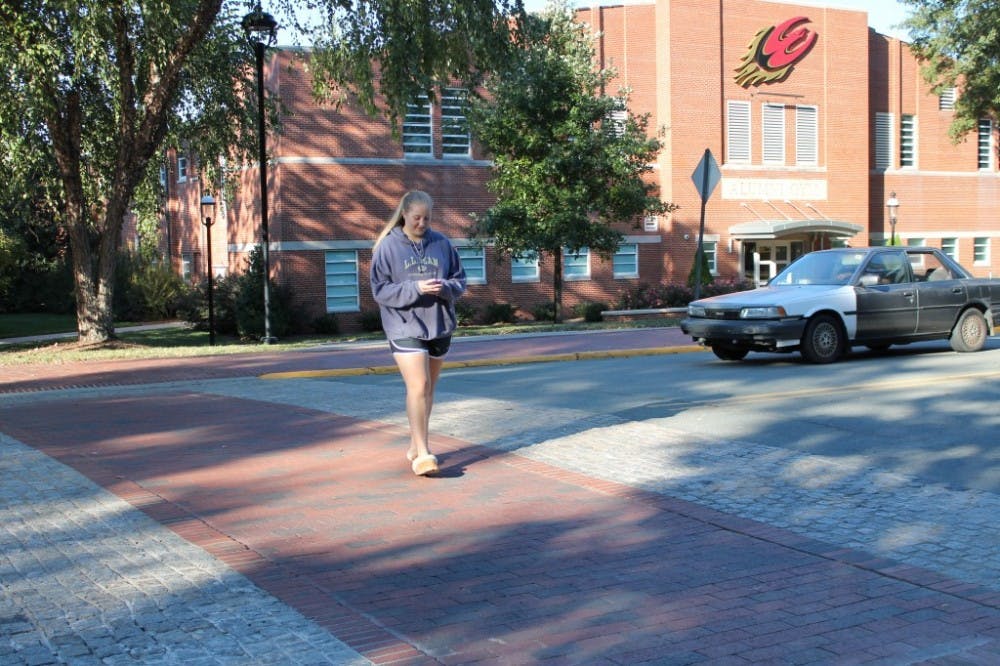“You have got to be kidding me!” a student exclaims as a car speeds through the crosswalk that bridges McEwen to West Haggard without slowing or stopping, disregarding students eager for Acorn or heading to class.
North Carolina law 20-175 states that the driver of a vehicle must stop to give the right-of-way to a pedestrian crossing at an intersection if a stop sign or stop light is not in place.
The law is intended to prevent accidents and assure safety to these “crosswalkers.” But for Elon University students who often don’t stop or look to make sure a car will stop, reliance on the driver to follow NC 20-175 can be a potential danger.
This, “no car is going to hit me” mentality stems from the fact that crosswalks are located on a relatively safe college campus. According to sophomore Maggie Hakas, this feeling of safety that causes students to worry less about cars.
“[The crosswalks] go right through the center of campus,” Hakas said. “You assume you have the right of way over cars and that they are going to stop.”
Hakas, a North Caroline resident, also said that “everyone in the South stops for pedestrians” as a part of Southern hospitality. Still, she waits at each crosswalk because she knows there are still rude drivers.
Hakas, who has a car on campus, said she always stop for pedestrians, although she gets angry when they cross the streets without a crosswalk or when they take too long. These people who “walk like a turtle” are holding up cars that are waiting to get through, she said.
“It’s one of those double standards,” said senior Yashvi Patel in regards to the frustrations of both drivers and pedestrians. “When you are a driver, you get mad at walkers for being slow, but when you’re a walker you get mad at cars for not stopping.”
First-year Olivia Hobbs has already noticed this norm. Although she waits at crosswalks at her home in Florida because of the high volume of cars, she does not wait as much at Elon.
“Most of the time I will just walk through them unless I see a car that won’t stop and hope that I wont get hit,” Hobbs said. “I feel that most people feel that [cars will stop], especially freshmen.”
She also said she believes cars are more likely to stop at certain intersections, like the three crosswalks on Haggard. She finds that not all cars stop on the intersection of East Haggard and North O’Kelley Avenues, particularly when students are not walking in larger groups.
Crossing leaves most students unscathed. Originally from traffic-heavy Atlanta, sophomore Caroline Patterson didn’t hesitate for fear of not being able to cross.
Last May, she was biking from Moseley to Alamance, assuming the oncoming cars would stop for her. Instead, she was thrown off her bike, suffering a gash on her head and a mid-range concussion. Now recovered, Patterson is much more conscious of her surroundings each time she crosses the street.
“Before the accident I crossed the streets without hesitation,” Patterson said. “Now, even my good friends have noticed that I am very hesitant when crossing the street. Until the driver has acknowledged that he’s seen me, I don’t cross. I still haven’t been able to ride my bike over the same crosswalk.”
Patterson said that students cross without looking because they are in a hurry or they simply expect cars to be the aware ones and stop for them.
She advised students to be more aware of their surroundings, especially when crossing alone because they are less noticeable. But she knows the security of being on a college campus causes students to be less aware.
“The truth is that students on campus don’t expect cars to hit them, so they do feel safe,” Patterson said. “I’m not sure how that feeling of security is going to change unless something happens to them. Unless we get back into the mood of looking left and right like when we were kids, college students are just going to continue crossing the street as if they own it.”


